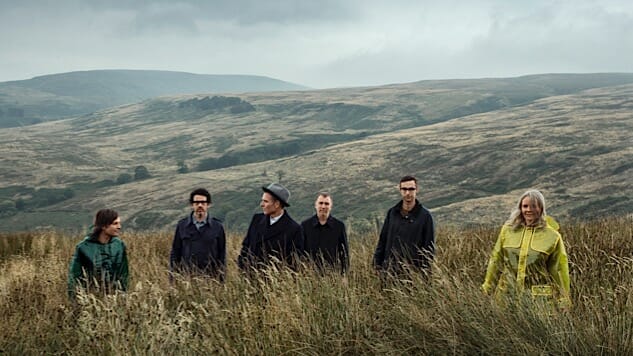Interview: Belle & Sebastian’s Stuart Murdoch on Writing New Music and Solving Our Human Problems
Photo courtesy Matador
Stuart Murdoch doesn’t like the idea of his band “maturing.” He thinks the word makes Belle and Sebastian (pictured above) sound like an old stinky cheese that’s gone off, but the changes the Glasgow indie-pop sextet have gone though over the years can’t be denied. Since their debut in the early ’90s with Tigermilk’s subdued chamber pop tunes about young (mostly fictional) social misfits, the band’s sound has gradually gotten bolder, more orchestral, even danceable, while the lyrics have increasingly dealt with real life.
How to Solve Our Human Problems, a new three-part EP series, embodies that evolution more completely than ever. A multipartite yet consistent release of intricate prog-pop songs, it’s suffused with animated disco beats and wistful words about adult relationships, loss and some political material, like “The Girl Doesn’t Get It.” “I’ll Be Your Pilot,” is a song by an obviously besotted Murdoch to his young son. Taken as a whole, the EPs survey this present moment, often a little sadly.
“Fundamentally, any form of suffering or confusion can make people rethink their lives, and also consider the problems of other people. Then compassion arises in their hearts. That’s why trouble and pain and suffering aren’t always to be considered terrible things. That is the human condition. That is where we are.”
So, how do we solve our human problems? Murdoch suggests it has a lot to do with compassion, a perspective informed by his newfound interest in Buddhism. Speaking on the phone from a train hurtling through France ahead of Friday’s release of EP No. 3, the singer and principal songwriter expanded on that and other topics, such as the roots of the peculiar sympathy (or compassion) for underdogs that has been a hallmark of Belle and Sebastian’s music since the beginning. Maybe they haven’t changed so much after all.
Belle and Sebastian’s lyrics have become more personal over time, referencing life as a band or events in your own life. Is that because you have more life experience to draw from?
I think what happened is that, when I was younger, I spent a lot of time dreaming, because I wasn’t experiencing life. I was on the sidelines, and so I had to live my life vicariously, almost like looking through a window at other people. So, I wrote about other people all the time. It seemed very glamorous to me. Now I have a family and I have a band surrounding me.
When you say you were on the sidelines, you mean because of your chronic fatigue syndrome? Have you connected with fans who also suffer from chronic fatigue?
Yes, many over the years. I didn’t make an effort to contact them back then, because I was just recovering and I wanted to put it behind me. I didn’t talk about it much at all. I didn’t even tell fans for years and it was hard to understand what was going on. Recently, I think it is my responsibility to try to get back to people, because I have such an experience with it now.
Read: The 100 Best Indie-Folk Albums of All Time
This trilogy of EPs marked the first time you recorded in Glasgow for years and the process was a bit more loose for this project than on your last few albums. How did you make the decision to do that? What did the recording process end up being like?
Half the band wanted to go away again and work with a producer and I said, “Let’s do it here.” I thought we should get our hands dirty and get closer to the music that we were wanting to produce. I was the pioneer, and I hoped that the band would follow me. We started looking around for smaller studios in Glasgow, because the scene has changed so much. We just started doing songs on a sort of ad hoc basis with a friend engineering. It felt less formal than an album. It just felt like we were compiling tracks, and trying different places and working with different people. That’s the way we used to do it 20 years ago. You know, sometimes we’d be a little more adventurous and we’d try different things, like recording with different singers, and then we’d put them out like singles or EPs.
-

-

-

-

-

-

-

-

-

-

-

-

-

-

-

-

-

-

-

-

-

-

-

-

-

-

-

-

-

-

-

-

-

-

-

-

-

-

-

-









































